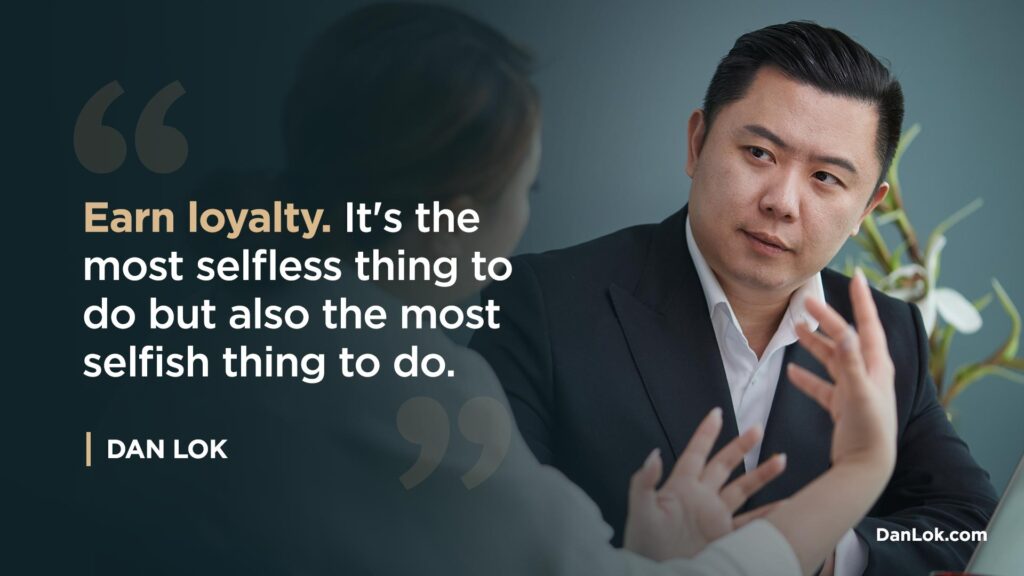What is the true meaning of loyalty? And how does it come into play when you are scaling your business?
Simply put, loyalty in business means that you put group interest and business interest ahead of self-interest. In any functioning team, loyalty to them has to be given, otherwise, the team is unlikely to succeed.
When you are scaling your business, it usually means that your team will face changes. Everybody has to work together as a team to successfully scale the business. There has to be mutual trust and understanding between the team members and the leaders alike.
No matter how high-performing a team is, loyalty has to come first. Team culture and team unity is of the utmost importance, especially when you are just starting out and slowly scaling your business.
How well can you trust your team members? How much can they trust you? Is everybody giving it their all? Do you expect too much or too few from the team members? All these factors are a sign of good leadership and very important for the meaning of loyalty.
How can you build a loyal team that will stay with you and your business when you scale? How can you make sure to lose as few people as possible?

What Exactly Does Scaling Your Business Mean?
You might think scaling your business means to grow your business. But that’s not the meaning of scaling. To scale a business means to handle more customers, sales, and output without making too many sacrifices. You want everything to be cost-effective and reasonable.
When scaling your business is unsuccessful, you might lose employees or team members because their workload increased too much and they couldn’t handle it anymore. Or perhaps you can’t keep up with the increased demand and let your customers down.
Scaling done right means your business is growing and you can handle the growth well in all capacities. The meaning of loyalty is extremely important for scaling your business.
The meaning of loyalty has many undertones. It means to be faithful to a cause, a person, a value, a team, a brand, etc.

What Exactly is the Meaning of Loyalty?
In a team, the word ‘loyalty’ has several connotations. The team members have to be loyal, and so does the leader. There has to be trust and loyalty between all team members. And finally, the leader and the team members are all loyal to a bigger cause.
Loyalty in the business sector can be best compared to Navy Seals. When Navy Seals go on a mission, they have to trust each other 100%. Their lives could depend on it.
Loyalty and trust become visible especially in situations where something is going wrong. Let’s assume you and your team going on a military mission. You send one of the teammates to scout and they tell you there are three enemies.
You trust your teammate, so you decide to take three team members with you to take down the enemy. But your scout was wrong, there are actually 10 enemies. Now, how you as the leader react in such a situation determines if this team will live on. You have two options.
You either tell them that somebody has to sacrifice themselves and pick a person to sacrifice. This, however, will destroy the trust of your teammates in you forever. Why? Because they are seeing that you put yourself before others. If you were to do that, that was the last mission this team ever went on. There won’t be any team anymore. The loyalty is gone.
But what if you pick the second option? Instead of sacrificing somebody, you come up with a plan. You can’t guarantee that all your Seals survive the mission but you show them that you want to get out of there together. You as the leader are in the front position and the teammates are behind you. That’s the meaning of loyalty in one of the most stressful situations.
What is the Meaning of Loyalty in Business?
Now, in business, it’s usually not a question of life or death. But being a good leader is a serious thing in business. You are responsible for your team. If you make a wrong move and the business can’t go on then the income of the whole team is gone.
At the same time, each individual on the team also has a responsibility. They have to be loyal to you and your vision so the business can succeed. It only works if both sides are in.
When you want to scale your business, you need two things. A team that performs well and – more importantly – a team you can trust. The best skills in the world don’t mean anything if the basic culture isn’t there. You can’t build a high-performance team without culture.
Loyalty is earned. Earning loyalty from your team is the most selfish and most selfless thing to do at the same time. It’s selfish because you need them in order to scale, to make your business successful. It’s selfless because you allow them to be part of something bigger.
Core Values
Before you grow and scale your business – possibly even before you hire anyone – you want to know what your business stands for. What are your personal core values that you want to represent in your business?
First, you have to live those core values. If you don’t do it then you can’t expect it from your employees or team members. As a leader, you are an example.
Now, once you know and live your core values, you want to hire a few people who share the same values. It’s best to hire for attitude and train for skill. That means it’s okay to hire a person who isn’t that refined in their skill, yet. You can always mentor them and increase their skill. Hire them for their culture and values first because that can’t be trained. Your job isn’t to change people so they fit with your culture. It’s better to hire a bit slower but therefore hire the right people from the start.
When you are getting into the phase of scaling your business, it’s easy to think about everything else but team culture. The new processes and systems you have to implement, the meeting with an important partner or client…It all seems so much more important than core values and culture.
But, your core values are the foundation of your business. Everything else you do is built on top of that. So, it’s vital for your success, to stay true to those values.
Loyalty should definitely be one of your business’ core values. But why?

Why is Loyalty Important for Scaling a Business?
Think about it like this. When your team isn’t loyal, it means they will leave the company pretty fast. If something better comes up they leave in the blink of an eye. That also means you have to hire and train new people all the time.
How effective will your scaling be if you have to train new people all the time? Not as effective as if it could be when members stay with you longer.
Most businesses lose money because too many employees leave the company. Especially if there is a certain period where the employee already resigned but has to stay for a few more weeks. That’s the phase where employees are unproductive. They already resigned anyway so why should they make any effort. But since their effort is low, you lose money. So on a surface level, the meaning of loyalty is also increased revenue.
If everybody is loyal and you can trust them with their work then you can focus on other things. You don’t have to look over their shoulder all the time. Instead, you face bigger challenges as a team and everybody does their part to help the business with scaling.
How to Hire the Right People
We briefly touched on this above. To create a loyal and trustworthy, high-performance team, you must first be loyal and trustworthy yourself. You have to embody your business’ core values.
Then, you hire people for attitude and mindset. Most business owners would make the mistake to hire employees who have great skills but don’t embody the core values of the business.
But really, in any winning business culture comes first and skill comes second. So how can you make sure you hire the right people from the beginning? The answer lies in your recruitment process.
Typical questions like “how much experience do you have?” don’t help anybody. The candidate could even lie about their experience, couldn’t they? There’s no way for you to know. So what can you do instead?
You have to ask questions that go deeper. Questions that give you indicators on how the person thinks. For example, a simple conversation about morning commute and traffic can tell you a lot. Is the person complaining about traffic but still arriving late for work? Then this is likely a person who doesn’t take ownership of their actions. Instead, they blame outside circumstances.
A different person might say yes traffic is horrible during rush hour that’s why I get to work half an hour earlier. This is a person who is focusing on solutions, instead of putting the blame on others. So, that’s the kind of person you’d want to have in your team.

How to Know When to Let Go of Someone
Most people would think the meaning of loyalty is to keep a team member around, no matter what. It’s partially true. A loyal leader doesn’t let go of employees and teammates easily.
If a person on the team isn’t performing well, you should rather mentor and train them first. Give them a chance to get better and play their role for the team to their fullest potential.
However, there might be moments where you tried everything. You mentored them, gave them time and resources to grow, but it just wouldn’t work. In such a case, you as the leader have to put the group interest above the interest for an individual.
If a team member under-performs and won’t change, he or she is damaging the whole team. It’s never an easy decision but here the real meaning of loyalty is to let them go.
We understand it can be very painful to lose a team member. Especially if they go work for one of your competitors instead. Balancing the loyalty to an individual and the loyalty to the whole team is an act that’s not so easy to perform.
That’s exactly why your first job is to mentor your people to get them up to speed. How long should you mentor and train them before you decide if you have to let them go? That depends on your industry mostly. In some industries, you lose money after two weeks if a person isn’t performing. In other industries, you might have six months. It also depends on what kind of hit you can take.
The loyalty to your team has to also be balanced with the loyalty to your job. You can’t under-perform on a job to protect one single teammate. That’s why leadership isn’t easy. You are constantly balancing things.

Your Role as a Leader
What’s the real meaning of loyalty for you as the leader? We think by now you’ve grasped the idea – it’s a balancing act. You have to be loyal to the whole team, to the individuals, and to your mission. You are the one who is calling the shots and who has to notice if something is imbalanced.
As the leader, you lead by example. You can’t ask your team to do better than you do. They look to you for guidance and mentorship. Let’s look back to our Navy Seal example. What did the great leader do? He was in the front row, protecting the team who is behind him. Bad leaders use their team as a shield. Great leaders guide them.
Your actions can enhance the team culture or destroy it. You have to care about the well-being of the team but still deliver great work. Who is responsible for guiding them? You are. At the same time trust them that you don’t have to watch every step they take. You put trust in your team but if anything goes wrong, it’s on you. A false sense of loyalty could do more harm than good.
When you are able to balance the different aspects of loyalty, your team will pick it up and follow your example. They see you are a person of integrity and walk the talk. This creates a team culture that you can build on as you scale your business.
How to Enhance Loyalty
As you know by now, a basic level of loyalty has to exist from the beginning. You hire people who already have the right culture to fit with your core values. You also understand your role as a leader to lead by example and increase loyalty that way.
Still, there are some tools and techniques you can use to increase the loyalty of your team. The first and most important thing is, that everyone one the team has to understand why they are doing what they are doing. For a team to work, every member has to have meaning in what they are doing. If they have no idea why they do certain tasks then it will be hard for them to find any meaning in it.
Here’s another tool to increase the meaning of loyalty in your team. Know the goals of your team members and align those goals with the goals of your business. This allows all teammates to support the team even more. It’s a win-win situation.

Want to Scale Your Business to 6-7 Figures and Beyond?
In times like these, your team is more dependent on you than ever before. Maybe your business is seeing some decline in sales and cash-flow. Perhaps you even had to lay off some team members, so the business could survive.
Especially in times like these, it could save you and your team if you look into ways to scale your business. Start now, so your business can steadily pick up and gain momentum. This way, you can charge ahead as soon as the lockdowns are over.
Dan Lok scaled his business from zero to eight-figures, online only. Interestingly enough, he did so by doing the opposite of what most online coaches would do. He built up his online presence, created irresistible offers, and focused on providing real value.
Since he scaled his business with a system in place, all team members stayed with him. Their loyalty and effort had a huge role in his success. Never underestimate the meaning of loyalty when you scale. Nobody can run an 8-figure business alone. Create your winning team in the beginning and take them with you on your mission.
Right now you can learn all the insider secrets and techniques from Dan Lok in his High-Ticket Influencer Program. He will show you exactly what he did to build his eight-figure empire in eight months. This could be the key for your business to do well in the upcoming crisis. Learn more about the High-Ticket Influencer Program here.





